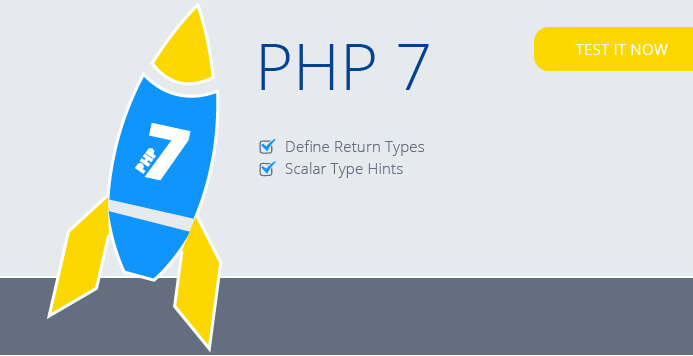PHP 7 introduced new features: scalar type declarations and return type declarations. In this post we will show how these features makes the maintenance of large pieces of code significantly easier by multiple developers and writing more robust tests. For the owner of the large PHP-based application it means more quality with less money spent in a long-term perspective for their custom software development.

Data types in PHP
All programs in all programming languages are composed of two concepts: data and operations on that data. Each programming language has certain predefined data types that can be recognized by its interpreter/compiler. A data type (or type) is a set of values and operations predefined for those values. PHP interpreter supports such data types as Boolean, integer, float, and string (which are commonly known as scalar data types), compound data types (array and object), and special data types (resource and NULL). There are different operations with data types available in PHP, including “type declarations” and “type juggling”.<
Type declaration in PHP
Type declaration is a statement in a code that requires the interpreter to check if a passed or returned value matches a certain type. If the given value is not of the expected type, then an error is generated. Type declarations (type hints) were in PHP 5, but in PHP 5 we could declare only non-scalar data types and could not declare return types (values that will be returned from a function or a method).<
PHP 7 type juggling for scalar types

How does PHP interpreter understand which data type it must deal with in each particular case when it is not clearly declared? PHP is a dynamically typed language, so it does the so-called «type juggling» wherever possible. «Type juggling» is a process of automatic determination of data type of a variable by PHP interpreter based on a set of predefined rules. Type juggling comes with potential loss of data in PHP5 without any notices. The problem of potential data loss due to type juggling was fixed in PHP 7 with scalar type declarations .
EXAMPLE 1.1 (PHP5)
- < ?php
- $a='x'; // string
- $b=2; //integer
- function FunctionName ($a, $b){
- return $a * $b;
- }
- echo FunctionName ($a, $b);
- ?>
RESULT: 0 (data loss due to the type juggling and absence of scalar type declaration in PHP5)
EXAMPLE 1.2 (PHP5)
- <?php
- $a="1text"; // integer due to the type juggling
- $b=2; //integer
- function FunctionName ($a, $b){
- return $a + $b;
- }
- echo FunctionName ($a, $b);
- ?>
RESULT: 3 (integer) data loss without Noticesp
EXAMPLE 1.3 (PHP7)
- <?php
- $a='x'; // string
- $b=2; //integer
- function FunctionName ($a, $b){
- return $a * $b;
- }
- echo FunctionName ($a, $b);
- ?>
RESULT: Warning: A non-numeric value encountered on line 5 (data loss with Notices)
RESULT:
PHP 7 new feature “scalar type declarations”
Scalar type declarations have been a top requested feature in PHP for a very long time. There has been a long-standing debate regarding the correct way to implement them.
What is scalar type declaration in PHP 7? Scalar type declaration means the statement to a function to accept arguments (parameters) or return values only of the given scalar data type (int, float, string or bool).
To specify a scalar type declaration, the name of the scalar data type should be added before the parameter name.
function FunctionName (int $a, int $b){ return $a + $b; }
In the above example, before calling this function, the PHP 7 interpreter will check if $a or $b variables are integers. If they are not, then the PHP 7 interpreter generates a special PHP 7 TypeError exception.
EXAMPLE 2.1 (PHP7)
- <?php
- // weak mode
- $a='x'; // string
- $b=2; //integer
- function FunctionName (int $a, int $b){
- return $a * $b;
- }
- echo FunctionName ($a, $b);
- ?>
RESULT: PHP Fatal error: Uncaught TypeError: Argument 1 passed to FunctionName() must be of the type integer, string given.
EXAMPLE 2.2 (PHP7)
- ?php
- // weak mode
- $a=1; // integer
- $b=2; //integer
- function FunctionName (int $a, int $b){
- return $a + $b;
- }
- echo FunctionName ($a, $b);
- ?>
RESULT: 3 (integer)
EXAMPLE 2.3 (PHP7)
- ?php
- // weak mode
- $a='1'; // integer due to the type juggling
- $b=2; //integer
- function FunctionName (int $a, int $b){
- return $a + $b;
- }
- echo FunctionName ($a, $b);
- ?>
RESULT: 3 (integer)
EXAMPLE 2.4 (PHP7)
-
?php
- // weak mode
- $a='1text'; // integer due to the type juggling
- $b=2; //integer
- function FunctionName (int $a, int $b){
- return $a + $b;
- }
- echo FunctionName ($a, $b);
- ?>
RESULT: PHP Notice: A non well formed numeric value encountered on line 5
RESULT: 3 (integer)
EXAMPLE 2.5 (PHP7)
- <?php
- // weak mode
- $a= 'text'; // string
- $b=2; // integer
- function FunctionName (int $a, int $b) {
- return $a+$b;
- }
- echo FunctionName ($a, $b);
- ?>
RESULT: PHP Fatal error: Uncaught TypeError: Argument 1 passed to FunctionName() must be of the type integer, string given
PHP 7’ new feature “strict mode”
By default, all PHP 7 files are in weak type-checking mode (as it was in previous versions of PHP interpreter). A new declare() directive is added, strict_types, which takes either 1 or 0. If 1, strict type-checking mode is used for function calls and return statements in this file. The nice thing about the possibility of using different modes is that you don’t have to worry if one library uses a strict mode and another does not - scalar type declarations only work in the file with the function call.
EXAMPLE 3.1 (PHP7)
- ?php declare(strict_types=1); // strict mode
- $a='1'; // string
- $b=2; //integer
- function FunctionName (int $a, int $b){
- return $a + $b;
- }
- echo FunctionName ($a, $b);
- ?>
PHP 7 new feature “return type declarations”
What is return type declarations in PHP7? Return type declaration is specifying the expected data types of the result that a function or a class method should return. Due to return type declaration, PHP, for example, can convert the integer result into a string before returning the result of the function.
EXAMPLE 4.1 (PHP7)
- ?php
- //weak mode
- $a='1'; // string
- $b=2; // integer
- function FunctionName ($a, $b) : string {
- return $a.$b;
- }
- echo FunctionName ($a, $b);
- ?>
RESULT: 12 (string due to the type juggling)
EXAMPLE 4.2 (PHP7)
- <?php declare(strict_types=1);
- $a=1; // integer
- $b=2; // integer
- function FunctionName ($a, $b) : string {
- return $a+$b;
- }
- echo FunctionName ($a, $b);
- ?>
RESULT: PHP Fatal error: Uncaught TypeError: Return value of FunctionName() must be of the type string, integer returned
Backward compatibility with PHP5 intepreter
Code with scalar type declarations or return type declarations will not work with PHP 5 interpreter.
EXAMPLE 5 (PHP5)
- ?php declare(strict_types=1);
- $a=1; // integer
- $b=2; //integer
- function FunctionName (int $a, int $b){
- return $a + $b;
- }
- echo FunctionName ($a, $b);
- ?>
RESULT: Warning: Unsupported declare 'strict_types'
Catchable fatal error: Argument 1 passed to FunctionName() must be an instance of int, integer given
Rate this article
Recommended posts
Our Clients' Feedback


















.png)
.jpg)
.jpg)
.jpg)
.jpg)
.png)
.jpg)
.jpg)
.jpg)
.jpg)
.jpg)
.jpg)
.jpg)
.jpg)
.jpg)
.jpg)
.jpg)
.jpg)
.jpg)
.jpg)
.jpg)
.png)
.jpg)
.png)
.png)
.jpg)
.png)
.png)
.png)
.jpg)
















We have been working for over 10 years and they have become our long-term technology partner. Any software development, programming, or design needs we have had, Belitsoft company has always been able to handle this for us.
Founder from ZensAI (Microsoft)/ formerly Elearningforce